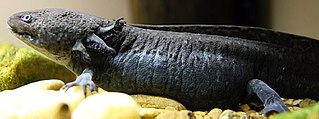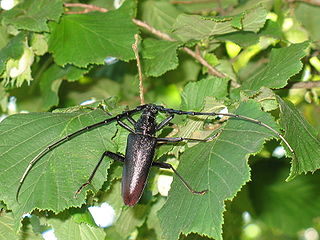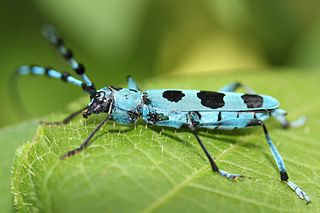
The axolotl is a paedomorphic salamander closely related to the tiger salamander. It is unusual among amphibians in that it reaches adulthood without undergoing metamorphosis. Instead of taking to the land, adults remain aquatic and gilled. The species was originally found in several lakes underlying what is now Mexico City, such as Lake Xochimilco and Lake Chalco. These lakes were drained by Spanish settlers after the conquest of the Aztec Empire, leading to the destruction of much of the axolotl's natural habitat.

Auguste Henri André Duméril was a French zoologist. His father, André Marie Constant Duméril (1774–1860), was also a zoologist. In 1869 he was elected as a member of the Académie des sciences.

Cerambyx is a genus of beetles in the family Cerambycidae. They are commonly known as capricorn beetles, as their strong, stout and curved antennae, each segment of which flares towards the tip, are reminiscent of the horns of an Alpine Ibex or "capricorn".

Rhagium is a genus of flower longhorn beetles in the family Cerambycidae, Cerambycidae.

Dorcasominae is a subfamily in the longhorn beetle family Cerambycidae. There are about 14 genera and more than 30 described species in Dorcasominae, found mainly in Asia and Africa. These genera are sometimes considered members of the tribe Dorcasomini, which would be the only tribe of this subfamily.

Cerambycini is a tribe of longhorn beetles classified under the subfamily Cerambycinae.

Achrysonini is a tribe of Long-Horned Beetles in the beetle family Cerambycidae. There are more than 20 genera and 50 described species in Achrysonini. They are found mainly in the Americas, but also in Europe, Asia, and Africa.

Callidiini is a tribe of longhorn beetles in the family Cerambycidae. There are more than 30 genera and 180 described species in Callidiini.

Criodion is a genus of Long-Horned Beetles in the beetle family Cerambycidae. There are about 11 described species in Criodion.
Plocaederus is a genus of Long-Horned Beetles in the beetle family Cerambycidae. This genus has a single species, Plocaederus bellator. It is known from the South American countries Brazil, Ecuador, Guyana, French Guiana, Paraguay, and Suriname.
Sphallambyx is a genus of beetles in the family Cerambycidae, containing the following species:

Sphallotrichus is a genus of beetles in the family Cerambycidae, containing the following species:

Compsocerini is a tribe of beetles in the subfamily Cerambycinae, containing the following genera:
Moneilema mexicanum is a species of beetle in the family Cerambycidae. It was described by Fisher in 1926.
Clinidium mexicanum is a species of ground beetle in the subfamily Rhysodinae. It was described by Louis Alexandre Auguste Chevrolat in 1873. It is endemic to the southern part of the Mexican Plateau. Clinidium mexicanum measure 6–8.5 mm (0.24–0.33 in) in length.
Sphallambyx chabrillacii is a species in the longhorn beetle family Cerambycidae. It is found in Costa Rica and Brazil.
Sphallambyx superbum is a species in the longhorn beetle family Cerambycidae. It is found in Peru, Ecuador, Bolivia, Brazil, and Colombia.
Rhagium mexicanum is a species of beetle in the family Cerambycidae. It was described by Casey in 1913.

Zuphioides mexicanum is a species in the beetle family Carabidae. It is found in the United States and Mexico.
Bembidion mexicanum is a species of ground beetle in the family Carabidae. It is found in North America.











